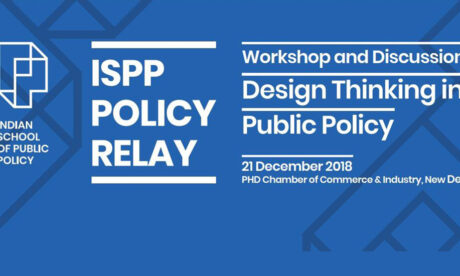Design Thinking in Public Policy

Indian School of Public Policy (ISPP) hosted a workshop and panel discussion on ‘Design Thinking in Public Policy’. It was the first event organised under ISPP Policy Relay series.
The event began with the welcome note by Dr. Parth J Shah, Director and Governing Board Member, ISPP. He apprised the participants on ISPP’s vision. He informed the audience about three key distinguishing features of ISPP. He said that ISPP is geared towards providing theoretical and applied knowledge of public policy to aspiring policy professionals. The intent is to build the conceptual foundation and provide essential policy design and management skills to students in order to make them a successful public policy practitioner. He said that ISPP will be an asset-light and talent-heavy institution as it will always strive to provide exceptional learning experience to students by getting eminent academicians and acclaimed policy professionals on board rather than focusing on building expansive and lavish infrastructure.
The welcome note was followed by the workshop on ‘Design Interventions in Public Policy’ conducted by Sukanto Roy, a leading design strategist. He shared his experiences of applying design thinking principles to solve local socio-economic problems in diverse contexts of rural areas of Tripura, Maharashtra & West Bengal. He informed participants about the different stages of user-centered policy design such as discovery (understanding local context), define (identification of problem), action plan, creating a prototype (solution) and testing. Two crucial aspects identified by him in using design thinking principles for policy design were understanding persona (creating a user/human profile that is representative of the population facing same/similar issue) and scenario (environment that includes physical infrastructure, basic amenities, social relations, power equations etc. that have a major influence on the given issue). He discussed in detail about a powerful tool called empathy map that is commonly used in understanding persona and scenario. He conducted an interactive exercise wherein participants were divided into small groups and each group were given a chance to select a particular state and identify any pressing issue in that state and use user-centered design process to think of persona and scenario and come up with some workable policy solution.
Following the workshop, domain experts got together for a panel discussion on ‘Design Thinking in Public Policy’. The panelists included Sukanto Roy; Harsh Shrivastava, CEO – Microfinance Institutions Network; and Dr. Aditya Dev Sood, serial social entrepreneur. The discussion, chaired by Dr. Parth J Shah, deliberated on the relevance and implications of design thinking in formulation and framing of sound public policies.
All the panelists agreed on the notion that design thinking is a powerful problem solving tool that puts human being (citizen/customer/beneficiary) at the centre and helps in understanding and defining problem-at-hand from their perspective and devise appropriate solutions that is relevant and contextual. Aditya Sood viewed design thinking as an informed and decentralized decision-making approach which provides scope for front line workers to use their wisdom and experience to design and modify solutions as per given context. Harsh Shrivastava suggested that design thinking should not be confined to upper echelons of our bureaucracy but needs to be brought down to mid-level and junior officers in order to have the maximum desired impact in execution of any public policy. Sukanto Roy gave examples of his work to show that how design-thinking led process helped in bridging the gap between government officials and population as they came together in understanding and solving local issues. Aditya said that the inclination to adopt design thinking in finding policy solutions by the state can be seen in recent years through organisation of events like idea hackathon. Harsh said that design thinking should be viewed as an iterative process that not only helps in framing sound policies but also provides scope to enhance and modify existing policies that are in tune with the changing times and trends.
The event was attended by over 40 participants. The audience included students, young working professionals, journalists and ex-servicemen.
Date: Fri, Dec 21, 2018
Time: 11:00 AM – 01:00 PM
Venue: Phd Chamber of Commerce & Industry


